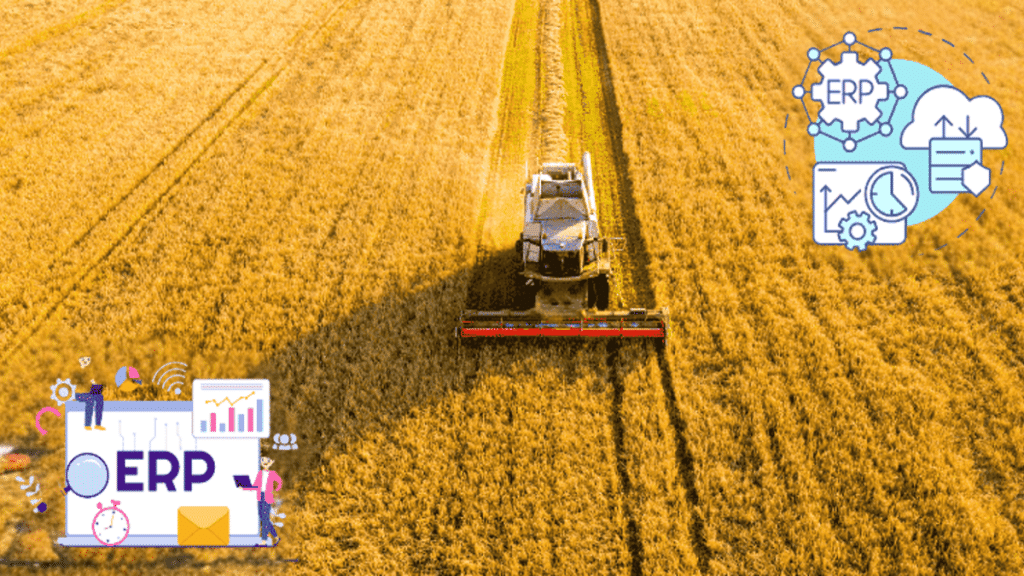The agriculture industry has always been the backbone of economies worldwide, but modern farming faces increasing challenges. Farmers and agribusinesses must navigate fluctuating market demands, climate change, rising operational costs, and regulatory compliance. To overcome these challenges, agricultural enterprises need efficient and technology-driven solutions.
This is where Enterprise Resource Planning (ERP) systems play a crucial role. ERP for the agriculture industry integrates various processes, such as crop management, inventory tracking, supply chain coordination, and financial planning, into a single platform. This ensures streamlined operations, better decision-making, and improved profitability.
What Is ERP for Agriculture?
An ERP system for agriculture is a centralized platform that helps farmers, agribusinesses, and food producers automate and manage their operations efficiently. It combines various farming processes, data points, and workflows into a single, integrated system.
How ERP Works in Agriculture
- Farm Planning & Crop Management: Helps schedule planting, track soil health, and manage irrigation.
- Inventory & Resource Management: Monitors stocks of seeds, fertilizers, pesticides, and equipment.
- Supply Chain & Logistics: Tracks product movement from farm to market efficiently.
- Financial & Accounting Tools: Automates budgeting, expenses, and tax compliance.
- Labor & Workforce Management: Schedules farm tasks, tracks labor costs, and ensures compliance with labor laws.
- Regulatory Compliance & Reporting: Maintains records for food safety, organic certification, and environmental regulations.
ERP systems streamline operations, reduce waste, and provide real-time data insights to help agribusinesses make informed decisions.
Key Benefits of ERP for the Agriculture Industry
1. Improved Farm Management & Productivity
Agricultural operations involve multiple moving parts, from land preparation and crop rotation to harvesting and storage. ERP solutions help farmers:
- Monitor field activities in real-time
- Analyze soil conditions, weather forecasts, and irrigation schedules
- Plan crop cycles efficiently to maximize yield
- Optimize resource allocation to reduce waste
By integrating Farm Management Software with ERP, agribusinesses can automate workflows and improve overall farm productivity.
2. Efficient Inventory & Resource Tracking
Managing farm resources, such as fertilizers, pesticides, and livestock feed, can be challenging without proper tracking. ERP systems help:
- Monitor stock levels in real-time
- Set alerts for low inventory to prevent shortages
- Reduce overstocking, which minimizes wastage and costs
- Track equipment usage and maintenance schedules
With automated inventory tracking, farmers reduce losses and optimize purchases based on actual needs.
3. Streamlined Supply Chain & Logistics
Agricultural products need timely transportation, storage, and distribution to maintain freshness and quality. ERP solutions help streamline the supply chain by:
- Tracking product movement from the farm to the warehouse to retailers
- Reducing post-harvest losses with efficient storage planning
- Optimizing logistics routes to reduce transportation costs
- Ensuring compliance with food safety standards
By integrating ERP with supply chain management tools, agribusinesses can ensure seamless farm-to-market operations.
4. Better Financial Planning & Cost Control
Agriculture businesses face fluctuating costs due to factors like weather, labor, and market prices. ERP software provides:
- Automated expense tracking for better budgeting
- Financial reporting tools for profitability analysis
- Tax compliance and government subsidy tracking
- Integration with accounting software for seamless bookkeeping
Farmers can use ERP to identify cost-saving opportunities and maximize profits with real-time financial insights.
5. Compliance with Government Regulations & Certifications
Agribusinesses must comply with various regulations related to food safety, environmental protection, and organic farming. ERP helps by:
- Maintaining detailed records for audits and certifications
- Tracking pesticide and fertilizer usage for compliance
- Automating documentation for organic and sustainable farming practices
- Ensuring labor law adherence for farm workers
With an ERP system, agribusinesses avoid penalties and enhance credibility in the market.
6. Data-Driven Decision Making
Agriculture businesses generate vast amounts of data, from weather patterns to soil quality and market trends. ERP provides:
- Real-time dashboards and analytics for better decision-making
- AI-driven insights to predict yield and market demand
- Historical data analysis to improve future farm planning
- Automated reports for tracking business performance
With data-driven farming, agribusinesses can make smarter, more profitable decisions.
7. Increased Sustainability & Eco-Friendly Practices
Sustainable farming is gaining importance, and ERP helps businesses adopt eco-friendly practices by:
- Reducing excessive pesticide and fertilizer use
- Optimizing water management through smart irrigation
- Tracking carbon footprint and reducing waste
- Enhancing farm biodiversity with crop rotation insights
By aligning with sustainability goals, farmers can boost their brand reputation and qualify for green certifications.
8. Integration with Emerging Agricultural Technologies
Modern farms are adopting advanced technologies such as AI, IoT, and blockchain. ERP systems seamlessly integrate with:
- IoT sensors for monitoring soil moisture and climate conditions
- Drones and GPS mapping for precision farming
- Blockchain for improved supply chain transparency
- Smart automation tools for reducing labor costs
These integrations ensure that farms remain competitive in a rapidly evolving industry.
How to Choose the Right ERP for Your Farm?
When selecting an ERP solution for agriculture, consider:
- Scalability – Can the ERP grow with your business?
- Ease of Use – Is it user-friendly for farmers and agribusiness staff?
- Cloud-Based Access – Can you manage farm data from anywhere?
- Integration Capabilities – Does it work with other farming software and IoT tools?
- Regulatory Compliance Features – Does it support organic certification tracking and food safety reporting?
A well-designed Farm Management Software integrated with ERP can boost efficiency, automate operations, and maximize profits.
Conclusion
The agriculture industry is evolving, and traditional farm management practices are no longer sufficient. By integrating ERP with modern farm management software, farmers can future-proof their businesses and stay competitive in the global market.
